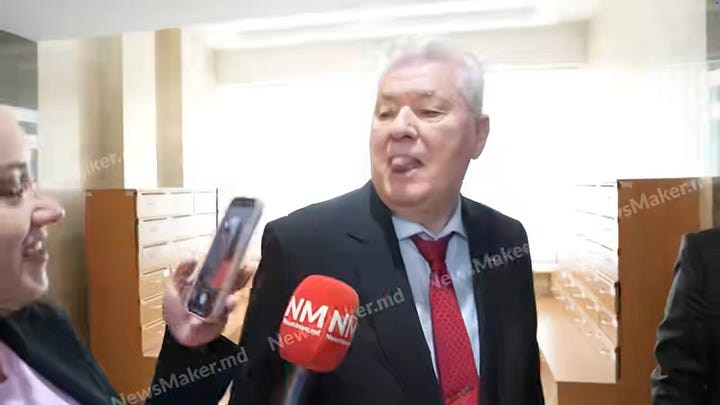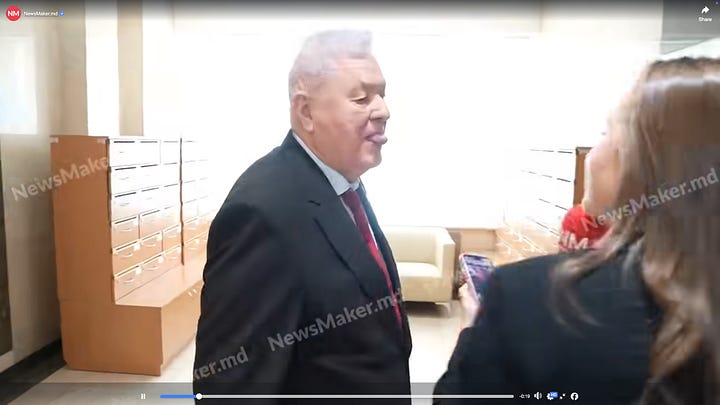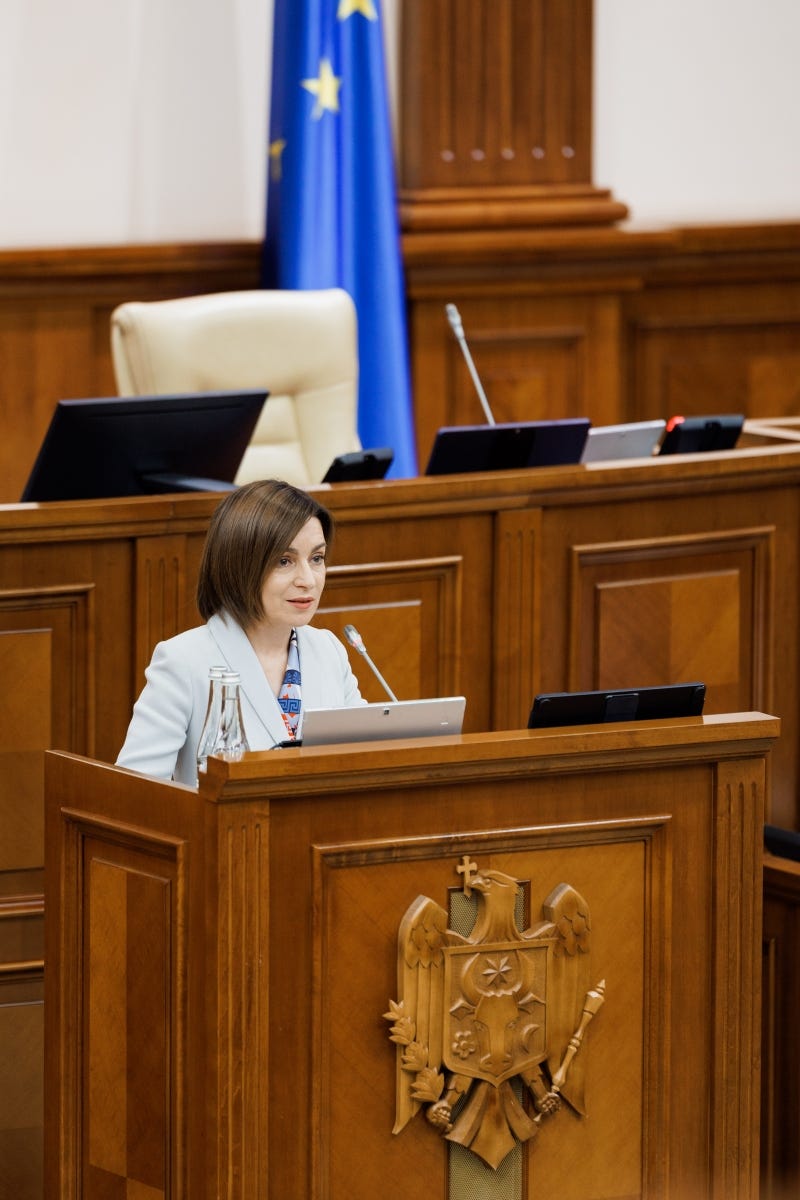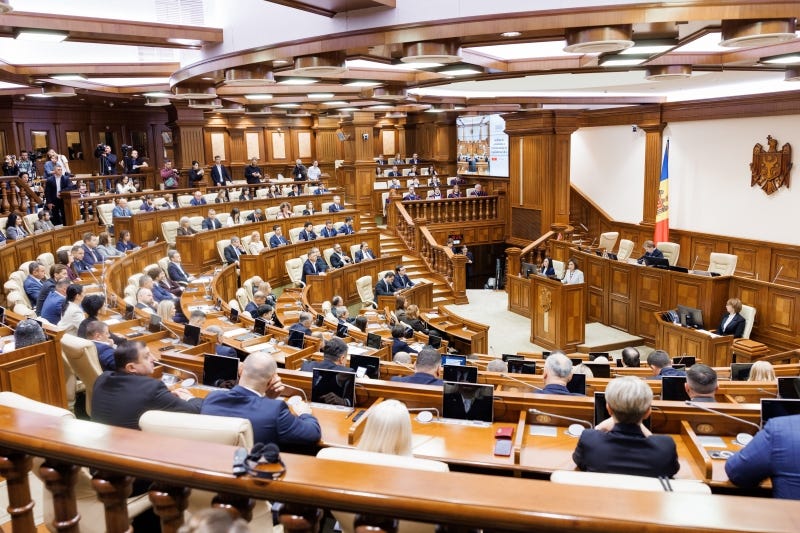On Wednesday President Sandu presided over the official opening of the newly elected parliament. There, she gave a speech calling on the new parliament to work diligently and focus on the completion of justice reform, an accelerated focus on European Integration and to tackle the complex issue of territorial-administrative reform1.
In her speech, she also called out the Kremlin’s hybrid attacks, and those who aided and abetted that effort who now sit in parliament. She stated:
“A few weeks ago, our country went through a tense election, with many trials and challenges. We experienced a campaign in which truth and lies, hope and fear were mixed.
Much of these tensions were not accidental - they were fueled from outside, by those who do not want a free and sovereign Moldova.
Despite these trials, Moldovans chose peace, development, and the European direction.”
(…)
“I know that there are (in this room) alleged defenders of democracy who have criticized the actions taken by the authorities to defend democracy from external interference, whether we are talking about combating illegal financing, interventions in the digital space, or eliminating candidates with anti-national intentions from the race.
All the more hypocritical is their deafening silence regarding the arrest of young people in Russia for humming a song in the street. I don’t think you would want your child or grandchild to experience something like that.
So, we will not receive lessons in democracy from those who took their cues from Moscow, where those who criticize the war and advocate for peace are sentenced to hard years in prison.”
The President closed her speech with a call to unite around the hard work to come saying:
“Dear citizens,
Honorable members of Parliament,
Distinguished guests,I know that the road ahead requires effort, patience, and courage. But our country has proven, time and again, that it knows how to rise, to come together, and to move forward.
The ability to unite around great national goals defines us as a people.
That is why we must join our forces alongside the hardworking and honest people of our country — from North to South, from villages and cities, at home and abroad.
For them and with them we must work — people who have endured hardships but have not lost hope; who, after so many decades of uncertainty, deserve to know that they can live in a peaceful, free, fair, and prosperous country.
European integration is the path through which this dream will become reality.
Let us work together — with faith — so that Moldova becomes a home of peace and hope for all its citizens.
May it be a good hour — and let’s get to work!”
Organizing Parliament
Following the official address of the President, parliament begins a process of self organizations that is typically pro-forma. In this case though, there were some surprises.
PAS leader Igor Grosu was again nominated by PAS to be speaker of parliament and was thus re-elected.
Next the MPs moved to officially form parliamentary factions. Typically, this is very simple - parties and blocs form factions. Basically, voters who supported PAS would expect them to form a single party in parliament. The Patriotic Bloc didn’t get this memo however. As we’ve previously written, Vladimir Voronin announced that the Communist Party would be leaving the Patriotic Bloc and forming their own faction. The Socialist Party then announced that they would do the same.
In their announcement, the Socialists said that their faction would be “based on three unshakable principles: sovereignty, social justice and traditional values.” They stated that they plan to build closer relations with 2 EU level political groups - “Identity and Democracy” and “Patriots for Europe.” They also called Victor Orban’s Fidesz Party and the SMER Party in Slovakia “our natural allies.”
For those who aren’t super roped in to EU level parties I’ll break this down in a footnote digression2.
With the Communists gone, and Socialists leaving, the only party remaining in the “Patriotic Bloc” is Vasile Tarlev’s Future of Moldova Party. They only had 1 MP on the bloc’s list, Mr. Tarlev himself. Commenting on the situation whereby he became a bloc of one he stated:
“I regret that my bloc colleagues made this decision, but I respect their choice. I remain loyal to the Patriotic Bloc. I have neither the right to join nor become a member of any other faction,”
With all of these strange maneuvers accomplished, we have a record number of factions in parliament. Here’s their breakdown and the leader they each elected:
The Party of Action and Solidarity (PAS) - led by Doina Gherman (55 seats)
The Socialist Party (PSRM) - led by Igor Dodon (17 seats)
The Communist Party (PCRM) - led by Diana Caraman (8 seats)
The Alternative Bloc - led by Gaik Vartanean (8 seats)
Party “Democracy at Home” (PPDA) - led by Vasile Costiuc (6 seats)
Our Party - led by Renato Usatîi (6 seats)
This gives us 6 factions in parliament and one independent MP (Vasilie Tarlev)3.
Recall, MPs Dinu Plîngău and Stela Macari, elected on the PAS lists, had previously stated that they would break off from PAS and stand as independents in parliament. Plîngău explained to Agora that for now these plans are on hold saying:
“I am currently part of the PAS faction. We discussed that we will return to these discussions after the Government vote.”
What Happened to the Patriotic Bloc?
We’ll return to this topic in more depth later, but it is very telling that this bloc of 3 parties fractured as soon as parliament officially opened. After a poorer than expected showing in the polls, it’s possible that both the Communists and the Socialists wanted to reassert their identities and brands - and distance themselves from the Kremlin’s “Patriot” project. Also possible is that everyone wanted to disassociate themselves with Mr. Tarlev, the MP with the most direct links to Ilan Shor in this parliament.
Whatever the case, Mr. Voronin chose not to share his thoughts. Asked various questions from a Newsmaker journalist he responded like this:


Nominating a Prime Minister
Following the official seating of parliament, President Sandu invited all factions to consult with her on the appointment of a Prime Minister. With the current PAS majority these were pro-forma meetings. The Communists refused even to meet the President, while Our Party, PPDA and the Socialists told her that they would not support any candidate she puts forward and would stand in opposition. The Alternative Bloc made no commitments either way, stating that they would wait for the presentation of the government program.
Following these consultations, President Sandu signed a decree on Friday October 24th designating Alexandru Munteanu as a candidate for Prime Minister. She wrote:
“I wish him success in forming a Government that will gain the trust of Parliament and fulfill the most important expectations of citizens: protecting peace, preparing the country for EU accession, strengthening the economy and increasing people’s living standards,”
Next, Alexandru Munteanu will present his proposed cabinet of ministers and government program to parliament for a vote of confidence. We don’t yet have a date set for this process, but it will likely occur next week.
Moldova’s 12th Parliament
This week Moldova’s 12th parliament since independence took their seats and began work. The composition of the 101 MPs elected on September 28th is likely to undergo many changes in the coming weeks. Those who will be appointed as ministers will leave parliament for the government, and others are expected to resign for other jobs - such as Chisinau Mayor Ion Ceban. When this happens replacements are found from the respective party lists4.
That said, let’s take a look at the 101 MPs that were seated this week. Of that group:
47 are beginning their first terms in parliament (including 22/55 PAS MPs) while 11 have are on their 4th or later mandate. Voronin is on his 9th.
12 MPs are under the age of 36 and 49 are between the ages of 36 and 50. Only 9 are over 63. The average age is 48.
The youngest 2 MPs are Anastasia Nichita and Eugeniu Sinchevici of PAS - both are 26. The oldest MP is Mr. Voronin at 84.
The 12th parliament may be a continuation of PAS as a majority, but it represents many changes in who is actually in power. This is a young parliament, and one with many new parties and factions. We’ll see if the government is also filled with new faces, or more of a continuation of the Recean government, next week.
I explained what this means in the last roundup here.
Confusingly, the EU parliamentary group “Identity and Democracy” has been defunct since 2024. Initially it was formed by some of the EU’s leading far-right, populist and Eurosceptic parties - namely Italy’s “League,” France’s National Rally and Germany’s AfD. The grouping was active from 2019-2024 but broke up during the 2024 EU parliamentary elections. At that time, a prominent member of the AfD made public comments praising the Nazi SS and the National Rally moved to separate from them.
This led the National Rally, League, Hungary’s Fidesz and other far-right parties to form the Patriots for Europe in the current EU parliament. AfD formed an even further right group called “Europe of Sovereign Nations Group.”
These groups typically call themselves “sovereigntist” political forces, rather than “Eurosceptic.”
In order to form a faction, you must have at least 5 MPs. Thus Mr. Tarlev is an independent MP by default, though one who associates with the Future of Moldova Party.
In theory, this is no problem for a party like PAS. They have a long list and new people will be called up as MPs as needed. Things are kinda tricky for the Patriotic Bloc however, as they maintain a common electoral list. The next 3 positions on their list are from the Socialists, so if a Communist leaves parliament (for whatever reason - including actuarial) they will be replaced by a Socialist. Same for Mr. Tarlev.



